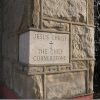I had a chance to hear Fr. Valery Lukianov speaking to his family and friends about the Thanksgiving season. Fr. Valery has always been a very engaging speaker and this was another example. Among other things, he spoke of how we should be glad that the entire nation, Christian or not, took a moment to be thankful, to say thanks to God or to a friend or family member. This caused me to reflect that Thanksgiving is a moment, for those of us who are Orthodox, to understand what it must have been like to live in an Orthodox country where feast days and traditions were largely shared by the entire culture. I do hope that you had a wonderful Thanksgiving season with those that you love.
It would be a sad life to live it without gratitude and thankfulness. Yet, it is interesting that while we often feel gratitude for those who love and serve us, we are slow to thank them. Though they may be grateful, I have known men who rarely thank their wives, and I have known wives who rarely thank their husbands. I know of children who rarely thanked their parents, and parents who rarely thanked their children. The list could go on and on. Family and friends serve us because they love us, and they don’t do it to be thanked. Yet, if gratitude is rarely shown, that service becomes ever more difficult to give. So, please: thank your priest, thank your parishioners, thank your parents, thank your children, thank your wife, thank your husband, thank the police, thank the military, and so on.
Above all, thank God from whom all blessings flow.
We need to go a little deeper. For those who follow Christ, gratitude is more than an attitude. As important as it is to express our thanks to those who have served us, giving thanks is more than words, more than an internal attitude. Allow me a personal memory. My brother and sisters and I thought to make Mother’s Day a bit more special than usual. So we planned breakfast in bed for mom and made some things to show how we were thankful for all that she did. Mom was happy and thanked us for the effort. Later, as we were talking, she reminded us that while she appreciated the effort, the best way to show our gratitude was to clean our rooms, pick up our socks, bring our dishes to the sink, etc., and on a daily basis. That lesson stuck with me, but I can’t say that I always followed it.
It is vital to a good life to feel gratitude and speak words of thankfulness, especially to God. Yet, I think God wants me to pick up my socks and bring my dirty dishes to the sink. I show my gratitude when I say my prayers as the Church teaches me. I show my gratitude when I pick up my dirty socks in confession. I show gratitude when I challenge my lazy and ungrateful flesh with fasting. Above all that I could do, I show my thankfulness most when I stoop down and bind the wounds of those who have fallen by the wayside; when I anoint them with wine and oil; when I carry them to the Inn, provide for their care, and promise to return. Such an act shows that I am thankful, not just in word, or in attitude, but from the depths of my soul.
The Greek word for Holy Communion is ευχαριστία (eucharistia). It means “thanksgiving.” So, every Sunday, we come to celebrate the feast of Thanksgiving (so does this mean turkey and dressing every Sunday?) We come to express from the depths of our souls the gratitude and joy that we feel for all that the Lord Jesus has done for us. May we also give thanks for all that He has done through us to others and know the joy that in our gratitude to Him, we have picked up our socks and washed the dishes.
Happy Eucharist to you all.

















